Classical Music News
The great Russian cellist, dies at age 80. Rostropovich entered the Moscow Conservatory in 1943, at the age of 16, where he studied not only the piano and the cello, but also conducting and composition.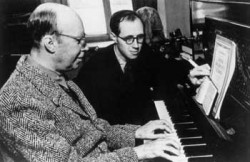 Among his teachers were Dmitri Shostakovich and Sergei Prokofiev. In 1945 he came to prominence as cellist when he won the gold medal in the first ever Soviet Union competition for young musicians. Rostropovich was a huge influence on the younger generation of cellists. His talent also inspired compositions from numerous composers such as Shostakovich, Khachaturian, Prokofiev, Britten, Messiaen, Dutilleux, Bernstein, and Penderecki. Rostropovich’s health declined in 2006 and was admitted to a Paris hospital at the end of January 2007, but then decided to fly to Moscow, where he had been frequently receiving care. Obituaries cited sources stating that the cellist suffered from intestinal cancer, while other sources report, he re-entered the Blokhin Cancer Institute on April 7, 2007, and died on April 27, 2007 (picture: Prokofiev and Rostropovich. Moscow circa 1950).
Among his teachers were Dmitri Shostakovich and Sergei Prokofiev. In 1945 he came to prominence as cellist when he won the gold medal in the first ever Soviet Union competition for young musicians. Rostropovich was a huge influence on the younger generation of cellists. His talent also inspired compositions from numerous composers such as Shostakovich, Khachaturian, Prokofiev, Britten, Messiaen, Dutilleux, Bernstein, and Penderecki. Rostropovich’s health declined in 2006 and was admitted to a Paris hospital at the end of January 2007, but then decided to fly to Moscow, where he had been frequently receiving care. Obituaries cited sources stating that the cellist suffered from intestinal cancer, while other sources report, he re-entered the Blokhin Cancer Institute on April 7, 2007, and died on April 27, 2007 (picture: Prokofiev and Rostropovich. Moscow circa 1950).
Charles Mingus – What is a Jazz Composer?
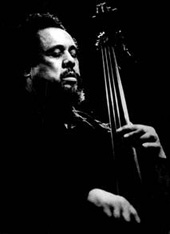 A performance of Mingus’s Epitaph
A performance of Mingus’s Epitaph will take place at Lincoln Center in New York City, on April 25, 2007. The music will be directed by composer Gunther Schuller, who also directed the premiere 18 years ago. Epitaph is a two-hour composition that was completely discovered during the cataloguing process after Mingus’s death. It was premiered by a 30-piece orchestra on June 3, 1989, ten years after his death (watch some video clips from the Epitaph performance from 1989 here). Because of this event, we felt the need to share something about him. These are the liner notes written by Charles Mingus for his album: “Let My Children Hear Music”
that was released on Columbia Records, in 1971. They appear on the record under the tittle of “What is a Jazz Composer?”, and present some of Mingus’s thoughts on being a jazz composer and musician. [Read more…]
Why is “Ugly” Music so Hard to Understand?
Classical Column. The Composer Speaks: Pablo Santiago Chin
Paraphrasing Berg’s article “Why is Schoenberg ‘s Music so Hard to Understand?”, it seems that this question is more relevant today than ever before if it is to be applied to “abstract” music. I use the term “abstract” after hearing a professor of composition of a prestigious American university expressing his regrettable opinions on avant-garde music. The mentioned professor (and composer) believes that Shostakovich’s music is more human and expressive than Boulez’s music, and supports his argument in the fact that Shostakovich is played all around the world while Boulez is only played in selective circles. [Read more…]
I use the term “abstract” after hearing a professor of composition of a prestigious American university expressing his regrettable opinions on avant-garde music. The mentioned professor (and composer) believes that Shostakovich’s music is more human and expressive than Boulez’s music, and supports his argument in the fact that Shostakovich is played all around the world while Boulez is only played in selective circles. [Read more…]
Stravinsky on Music Composition
Classical Book Highlights:
During the academic year 1939-1940, when he was about 58 years old, Stravinsky delivered the Charles Eliot Norton Lectures at Harvard University. Speaking in French, (an English translation was published in 1947 by Arthur Knodel)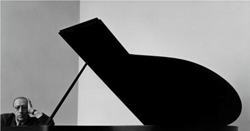 he began by saying: “I cannot conceal from you how happy I am to be speaking for the first time to an audience that is willing to take the trouble of listening and learning before judging.” These lectures appeared with the name of Poetics of Music in the Form of Six Lessons
he began by saying: “I cannot conceal from you how happy I am to be speaking for the first time to an audience that is willing to take the trouble of listening and learning before judging.” These lectures appeared with the name of Poetics of Music in the Form of Six Lessons, on which Stravinsky deals with different topics like: the phenomenon of music, the composition of music, musical typology, the avatars of Russian music, and the performance of music. The following paragraphs are a collection of a few reading highlights we gathered on Stravinky’s views on composition. They are presented here in a different order than they appear in the book, and we also added subtitles in order to make the reading more organized, as they are as we just mentioned, fragments of some of Stravinsky’s thoughts. [Read more…]
Rodolfo Zuniga – Contemporary Jazz Musician
Jazz Interview of the Month / Sounds
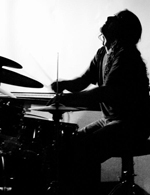 This month we feature an interview with jazz drummer and composer Rodolfo Zuniga. Born in San Jose, Costa Rica and now residing in Miami Florida, Zuniga is the leader of The Rodolfo Zuniga Quintet, a young contemporary jazz group that is causing a stir in the Miami music scene. Zuniga released his debut album Premonition last November 2006, including compositions by himself (listen to tracks below), Fernando Ulibarri and Rob Smiley. In 2005, his band was featured in a one week residency with Dave Douglas that culminated in a concert at Carnegie Hall. Zuniga is also active as a sideman in the South Florida scene with jazz names like Gary Campbell, Michael Gerber, Alex Norris, Othello Molineaux and Ira Sullivan. In our recent interview with him, we had the opportunity to hear about the views and insight of a young jazz musician and composer of today. [Read more…]
This month we feature an interview with jazz drummer and composer Rodolfo Zuniga. Born in San Jose, Costa Rica and now residing in Miami Florida, Zuniga is the leader of The Rodolfo Zuniga Quintet, a young contemporary jazz group that is causing a stir in the Miami music scene. Zuniga released his debut album Premonition last November 2006, including compositions by himself (listen to tracks below), Fernando Ulibarri and Rob Smiley. In 2005, his band was featured in a one week residency with Dave Douglas that culminated in a concert at Carnegie Hall. Zuniga is also active as a sideman in the South Florida scene with jazz names like Gary Campbell, Michael Gerber, Alex Norris, Othello Molineaux and Ira Sullivan. In our recent interview with him, we had the opportunity to hear about the views and insight of a young jazz musician and composer of today. [Read more…]
Music Composition for the Screen
Film Scoring Programs:
 The Music Department at Columbia College Chicago offers the Master of Fine Arts degree in Music Composition for the Screen, one of the few advanced degrees in music scoring for film, television and other visual media in the United States. It is an interdisciplinary curriculum that draws upon five academic departments including: Music, Film/Video, Audio Arts & Acoustics, Theater and Television (Columbia’s film and video department is acknowledged as the largest in the world). The last semester is spent in Los Angeles, California and is the vital part of the program. [Read more…]
The Music Department at Columbia College Chicago offers the Master of Fine Arts degree in Music Composition for the Screen, one of the few advanced degrees in music scoring for film, television and other visual media in the United States. It is an interdisciplinary curriculum that draws upon five academic departments including: Music, Film/Video, Audio Arts & Acoustics, Theater and Television (Columbia’s film and video department is acknowledged as the largest in the world). The last semester is spent in Los Angeles, California and is the vital part of the program. [Read more…]
Michael Brecker dies at age 57 (1949-2007)
Jazz News:
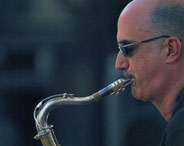 NEW YORK — Following a two and a half year battle with MDS and then leukemia, tenor saxophonist Michael Brecker passed away on January 13, 2007. During his lifetime Brecker won 11 Grammy Awards and was among the most influential musicians in jazz since the 1960s. His discography, containing more than 900 albums, started in 1969, playing on the record “Score,” with a band led by his brother, the trumpeter Randy Brecker. His technique on the saxophone was widely emulated, and his style was much-studied in music schools throughout the world. Jazziz magazine recently called him “the most influential tenor stylist of the last 25 years”.
NEW YORK — Following a two and a half year battle with MDS and then leukemia, tenor saxophonist Michael Brecker passed away on January 13, 2007. During his lifetime Brecker won 11 Grammy Awards and was among the most influential musicians in jazz since the 1960s. His discography, containing more than 900 albums, started in 1969, playing on the record “Score,” with a band led by his brother, the trumpeter Randy Brecker. His technique on the saxophone was widely emulated, and his style was much-studied in music schools throughout the world. Jazziz magazine recently called him “the most influential tenor stylist of the last 25 years”.
Free Wolfgang!
Classical Music News:
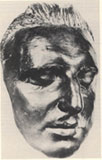 Vienna (AFP) – The complete printed NMA (New Mozart Edition) is now available to download from The Mozart Institute website: “The purpose of this website is to make Wolfgang Amadeus Mozart’s musical compositions widely and conveniently accessible to the public, for personal study and for educational and classroom use,” the Mozarteum said in a statement. The website draws from the original Neue Mozart Ausgabe paper version developed since 1954 by internationally renowned musicologists and comprising over 125 booklets of sheet music, whose origin has been painstakingly authenticated, the Salzburg foundation said.
Vienna (AFP) – The complete printed NMA (New Mozart Edition) is now available to download from The Mozart Institute website: “The purpose of this website is to make Wolfgang Amadeus Mozart’s musical compositions widely and conveniently accessible to the public, for personal study and for educational and classroom use,” the Mozarteum said in a statement. The website draws from the original Neue Mozart Ausgabe paper version developed since 1954 by internationally renowned musicologists and comprising over 125 booklets of sheet music, whose origin has been painstakingly authenticated, the Salzburg foundation said.
The “Digital Mozart Edition” (DME) website (http://dme.mozarteum.at) features over 600 works by Wolfgang Amadeus Mozart, separated into ten categories, from concertos for orchestra to chamber music and pieces for piano.
Oliver Knussen – British Composer
Interview / Classical Book Recommendation of the month:
This is a condensed version of an interview with British composer and conductor Oliver Knussen (b. 1952) by Paul Griffiths. It’s part of several interviews included in Griffith’s “New sounds, new personalities: British composers of the 1980’s”
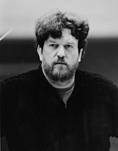 (the format of this interview is similar to the format we will be using at composersnewpencil.com for interviewing composers and performers).
(the format of this interview is similar to the format we will be using at composersnewpencil.com for interviewing composers and performers).
Oliver Knussen’s music occupies a regularly revisited place in concert and opera programmes worldwide. His Third Symphony, his opera Where the Wild Things Are and Violin Concerto are among the most frequently performed British works of recent times.
Paul Griffiths: Do you keep regular hours for composing?
Oliver Knussen: I’m trying to learn how to. My regular hours used to be from 11 at night till 4 in the morning, largely because that’s when the phone doesn’t ring and there are less things to think about. [Read more…]
Zappa – Does Humor Belong in Music?
Performance / Video:
Frank Zappa. The Purple Lagoon. Saturday Night Live NBC, 11 December 1976. Featuring John Belushi as Samurai “Be-Bop” Futaba on saxophone, Ruth Underwood on marimba, Patrick O’Hearn on bass and Terry Bozzio on drums. Born in Baltimore, Maryland on December 21, 1940, Frank Zappa was a counter-culture icon. Leading a life devoted to composition, he worked in almost every musical genre. He wrote for pop, rock and jazz ensembles (producing more than fifty albums) as well as for classical chamber ensembles and orchestras. “What do you do for a living, Dad?” If any of my kids ever asked me that question, Zappa said, the answer would have to be: “What I do is composition. I love putting little black dots on music paper…I’d sit for sixteen hours at a time, hunched over a chair with a bottle of India ink, and draw beams and dots. [Read more…]